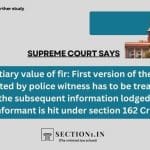Onerous Pre-Arrest bail conditions and Legal maxim
1. ‘Lex non cogit ad impossibilia’ means ‘the law does not compel a man to do what he cannot possibly perform’. The said maxim is being followed as an adage and with alacrity. We are constrained to refer to the said maxim on being pained to see that despite a catena of decisions deprecating the practice of putting onerous conditions for pre-arrest bail such orders are being passed without giving due regard to the binding precedents.
Pre-Arrest bail was granted in complaint case
2. The case on hand arises from an order dated 30.08.2023 passed by the High Court of Judicature at Patna in Criminal Miscellaneous No.57492 of 2023 whereby and whereunder the High Court granted provisional pre-arrest bail in Complaint Case No.1100 of 2021 registered against the appellant herein, alleging commission of offences punishable under Section 498A of the Indian Penal Code, 1860 (for short ‘the IPC’) and Section 4 of the Dowry Prohibition Act, 1961.
Judgments cited
5. Before scanning the conditions as mentioned above, we think it appropriate to refer to some of the relevant decisions of this Court, in the contextual situation. A Constitution Bench of this Court in Shri Gurbakash Singh Sibbia & Ors. v. State of Punjab [(1980) 2 SCC 565] held thus: –
“26. We find a great deal of substance in Mr.Tarkunde’s submission that since denial of bail amounts to deprivation of personal liberty, the court should lean against the imposition of unnecessary restrictions on the scope of Section 438, especially when no such restrictions have been imposed by the legislature in the terms of that section. Section 438 is a procedural provision which is concerned with the personal liberty of the individual, who is entitled to the benefit of the presumption of innocence since he is not, on the date of his application for anticipatory bail, convicted of the offence in respect of which he seeks bail. An over-generous infusion of constraints and conditions which are not to be found in Section 438 can make its provisions constitutionally vulnerable since the right to personal freedom cannot be made to depend on compliance with unreasonable restrictions. The beneficent provision contained in Section 438 must be saved, not jettisoned. No doubt can linger after the decision in Maneka Gandhi [Maneka Gandhi v. Union of India, (1978) 1 SCC 248], that in order to meet the challenge of Article 21 of the Constitution, the procedure established by law for depriving a person of his liberty must be fair, just and reasonable. Section 438, in the form in which it is conceived by the legislature, is open to no exception on the ground that it prescribes a procedure which is unjust or unfair. We ought, at all costs, to avoid throwing it open to a Constitutional challenge by reading words in it which are not to be found therein.”
(emphasis supplied)
6. In Parvez Noordin Lokhandwalla v. State of Maharashtra & Anr [(2020) 10 SCC 77] this Court held: –
“…The human right to dignity and the protection of constitutional safeguards should not become illusory by the imposition of conditions which are disproportionate to the need to secure the presence of the accused, the proper course of investigation and eventually to ensure a fair trial. The conditions which are imposed by the court must bear a proportional relationship to the purpose of imposing the conditions. The nature of the risk which is posed by the grant of permission as sought in this case must be carefully evaluated in each case.”
No impossible and impracticable conditions shall be imposed
7. We do not think it necessary to burden this judgment by multiplying the authorities on this subject as the constant and consistent view of this Court on matters granting a prayer for bail under Section 438 of the Code of Criminal Procedure, 1973 (for short ‘the Cr.P.C.’) is that after forming an opinion, taking note of all relevant aspects, that bail is grantable, conditions shall not be put to make it impossible and impracticable for the grantee to comply with. As held by this Court in Parvez Noordin’s case (supra), the ultimate purpose of putting conditions while granting pre-arrest bail is to secure the presence of the accused and thus, eventually to ensure a fair trial and also for the smooth flow of the investigating process.
Conditions set out in the Hon’ble High Court order is set aside
9. The above discussions tend us to hold that the conditions as mentioned above contained in paragraph 6 of the impugned order for the release of the appellant on the provisional bail cannot be sustained and as such the said conditions to give undertaking that the appellant would fulfil all physical and financial requirements by way of an affidavit are set aside. However, this shall not be understood to have an order releasing both of their marital obligations and duties and we hope and trust that the couple will continue to strive to restore their domesticity.
10. The order granting the bail is made absolute and the appellant in the event of his arrest be released on bail subject to the same terms stipulated by the High Court under the impugned order regarding suretyship as also the liability to comply with conditions as laid down under Section 438(2), Cr. P.C. Needless to say, that this will further be subject to the final outcome of the pending complaint case. The impugned order stands set aside only to the aforesaid extent and accordingly, the appeal stands disposed of.
Party
Sudeep Chatterjee …Appellant(s) Versus The State of Bihar & Anr. …Respondent(s) – Criminal Appeal No. of 2024 (Arising out of SLP (Crl.) No.2011 of 2024) – 2024 INSC 567
Further study





